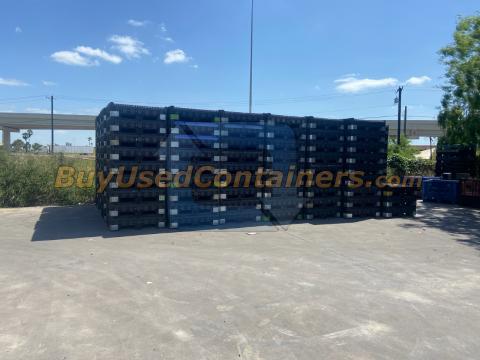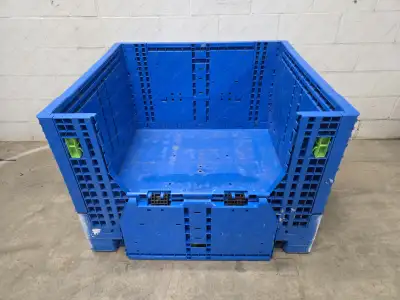How refurbished bulk containers and used bulk containers support green business practices
Wiki Article
The Ultimate Guide to Selecting the Right Mass Containers for Your Business Demands
Choosing the proper mass containers is essential for any organization that counts on reliable logistics. Various kinds of containers exist, each created for particular products and applications. Elements such as size, product compatibility, and regulatory standards play a significant role in this decision-making procedure. Comprehending these components can result in enhanced functional effectiveness. However, many services ignore crucial facets that might improve their general efficiency and sustainability. What are these factors to consider?Recognizing Different Types of Mass Containers
Mass containers function as essential devices for businesses looking for efficient storage space and transport remedies. These containers come in different kinds, each designed to satisfy details functional demands. One usual kind is the intermediate bulk container (IBC), which is ideal for granulated and liquid materials, offering a balance of capability and maneuverability. An additional preferred choice is the mass bag, or FIBC, ideal for completely dry, flowable items. These flexible containers are light-weight and can be quickly transported and saved. For larger materials, inflexible bulk containers are usually employed, offering sturdiness and security for risk-free handling. Additionally, there are specific containers tailored for harmful materials, guaranteeing compliance with security laws. Recognizing the distinctive qualities of these bulk container kinds enables businesses to make informed decisions that enhance logistics and minimize expenses. By choosing the best container, companies can enhance their functional performance and streamline their supply chain procedures.Key Material Factors To Consider for Bulk Containers
When picking mass containers, it is necessary to contemplate the materials made use of in their building and construction. Aspects such as sturdiness, chemical, and strength compatibility play a critical duty in making sure the containers meet specific functional demands. Furthermore, weight and portability concerns can influence both efficiency and transportation logistics.Product Durability and Stamina
Longevity and stamina are important factors in picking materials for bulk containers, as they directly affect the container's capacity to hold up against different ecological problems and handling processes. Materials such as high-density polyethylene (HDPE), polypropylene, and stainless-steel are generally favored for their robust properties, using resistance to temperature level, abrasion, and impact changes. The choice of product likewise impacts the total life-span of the container; more powerful products typically lead to less constant substitutes, causing set you back financial savings gradually. Additionally, the weight of the product can affect shipping expenses and ease of handling. Companies need to consider their details operational atmospheres and the possibility for wear and tear to guarantee peak durability and strength in their mass container selection.Chemical Compatibility Elements
Comprehending chemical compatibility is essential for picking mass containers, as the products used have to withstand the certain substances they will hold. Different variables influence compatibility, consisting of the chemical nature of the contents, temperature level, and period of storage. Harsh chemicals may need containers made from stainless steel or specialized plastics that withstand deterioration. In addition, responsive compounds can create heat or gases, necessitating aired vent or pressure-rated containers. The choice of container material, whether polyethylene, polycarbonate, or metal, must align with the chemical homes of the kept compounds to avoid leaks or violations. Eventually, a detailed assessment of these compatibility factors ensures secure handling and storage, protecting both employees and the atmosphere while keeping item stability.Weight and Portability Worries
Choosing mass containers includes not only assessing chemical compatibility yet also thinking about weight and portability. Organizations have to examine the convenience of handling and transport to maximize efficiency. Light-weight materials like high-density polyethylene (HDPE) or light weight aluminum can assist in much easier activity and reduce shipping expenses. Alternatively, larger containers may supply enhanced sturdiness yet can hinder mobility, specifically in environments needing regular relocation. In addition, the layout of the container should enable convenient training and piling, making sure ergonomic safety for employees. Firms need to additionally consider the framework readily available for transport; for instance, containers compatible with forklifts or pallet jacks can improve procedures. Eventually, the ideal equilibrium in between weight and transportability straight affects operational effectiveness and expense effectiveness.Sizing Your Mass Containers for Optimum Performance
When sizing mass containers, businesses must carefully assess the measurements required to suit their details items. Additionally, weight capability is a crucial factor that influences effectiveness and security throughout transportation and storage. Efficient sizing not only maximizes room yet additionally maximizes functional workflows.Determining Container Dimensions
Choosing the appropriate measurements for mass containers is important for maximizing effectiveness in storage space and transport. Organizations need to assess their certain requirements, taking into consideration elements such as readily available area, the nature of the goods being kept, and the methods of transportation utilized. Precise measurements guarantee that containers fit ideally in storage facilities and vehicles, minimizing lost room and decreasing taking care of time. Standard sizes can use benefit, but personalized dimensions could be required for unique requirements or to suit particular products. Additionally, it is essential to review stacking abilities and ease of access, as these variables influence total operational efficiency. Ultimately, the right dimensions lead to boosted organization and structured logistics, profiting the total performance of the service.Weight Capability Considerations
Recognizing weight capability click here is important for services intending to enhance their bulk container efficiency. The weight ability of a container straight influences storage abilities, transportation logistics, and total operational prices. Selecting containers with the suitable weight limits guarantees that businesses can safely store and move their products without running the risk of damage or compliance problems. Overloading containers can result in architectural failings, while underutilizing capability lead to wasted resources. When picking containers, it is crucial for services to evaluate their product weights and think about any regulative needs. Additionally, variables such as the kind of product, intended use, and ecological conditions ought to likewise affect weight ability choices. By examining these aspects, organizations can enhance efficiency and guarantee a streamlined supply chain.Regulatory Compliance and Safety And Security Specifications

Regulative conformity and security standards play an essential duty in the selection of bulk containers for organizations. Organizations should guarantee that their containers meet different policies established by regional, nationwide, and global authorities. These criteria typically concern material safety, structural integrity, and appropriate labeling, which aid protect against crashes and assure the risk-free transportation of products.
Additionally, adherence to industry-specific guidelines, such as those from the Fda (FDA) or the Occupational Security and Wellness Administration (OSHA), is vital for business handling harmful materials or food items. Non-compliance can lead to penalties, lawful concerns, or damages to a business's reputation.
Organizations need to also consider the container's compatibility with the products being stored or transferred to prevent contamination or chain reaction (refurbished bulk containers). To sum up, understanding and carrying out governing conformity and safety criteria is essential for the reliable and accountable use bulk containers
Sustainability Options for Eco-Friendly Bulk Containers

Firms are likewise discovering alternatives made from recycled materials, which not only preserve resources but also support the recycling market. Innovations in style permit for lighter containers that call for much less energy to transportation, even more boosting sustainability. By integrating these green mass container options, services can demonstrate their commitment to ecological stewardship while satisfying customer demand for lasting techniques. This change not just aids the planet but can also improve brand name credibility and customer loyalty.
Cost-Effectiveness and Budgeting for Bulk Containers
While several services concentrate on sustainability, cost-effectiveness continues to be a crucial variable when selecting bulk containers. Organizations has to analyze the first acquisition price, as well as long-term functional costs, to ensure financial stability. Factors such as resilience, maintenance, and reusability play a significant role in identifying overall expenses.Purchasing premium containers might generate greater ahead of time expenses however can lead to savings with reduced replacement prices and lowered waste. Furthermore, services must consider transport costs and storage space performance, as these can influence the overall budget.

Often Asked Questions
Just how Do I Figure Out the Right Container for Hazardous Products?
To identify the best container for dangerous materials, one must evaluate compatibility with the material, think about the container's material, check for governing compliance, and analyze capacity and safety and security functions to assure appropriate handling and storage.Can Mass Containers Be Personalized for Specific Products?
Yes, bulk containers can be customized for certain items. used collapsible containers. Various attributes, such as size, design, and product, can be tailored to meet special demands, making sure perfect security and effectiveness for transferring and keeping various itemsWhat Is the Ordinary Life Expectancy of Various Mass Container Kind?
The average life expectancy of mass container kinds varies; plastic containers last 5-10 years, steel containers 10-20 years, and wooden containers usually last 3-7 years, depending on use, maintenance, and environmental conditions.Just how Should I Clean and Maintain Mass Containers?
To clean up and preserve bulk containers, one ought to regularly inspect for damage, remove deposit, wash with appropriate detergents, rinse thoroughly, and warranty appropriate drying prior to storage. Complying with maker standards enhances long life and safety during use.Exist Rental Options for Mass Containers Available?
Yes, countless companies supply rental options for bulk containers, providing flexibility for companies. These services can accommodate various demands, permitting firms to handle supply effectively without the dedication of purchasing containers outright.Longevity and toughness are critical factors in selecting products for mass containers, as they directly influence the container's capacity to hold up against various ecological problems and taking care of procedures. Understanding chemical compatibility is essential for choosing mass containers, as the products utilized have to resist the specific substances they will hold. Understanding weight capacity is vital for companies aiming to maximize their mass container efficiency. Governing compliance and safety and security standards play a crucial role in the option of bulk containers for businesses. While numerous companies focus on sustainability, cost-effectiveness remains a vital element when picking mass containers.
Report this wiki page